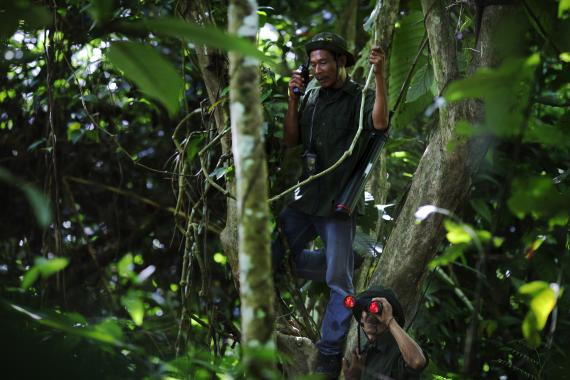Tackling Illegal Logging in Ulu Masen, Aceh
Current initiative
Published

Muktar, age 44, patrolling the Ulu Masen forest in Aceh, Indonesia. Credit: Abbie Trayler-Smith / Panos Pictures / DFID
Following the tsunami in 2004, Ulu Masen’s forests in Aceh, Indonesia, came under extreme pressure to supply the large-scale reconstruction effort required in the province. In response, in 2008 FFI and local partners designed and implemented a community-based ‘anti-illegal logging network’ to tackle this issue. Various stakeholders were brought together to focus on strengthening the forest monitoring and protection systems, and institutions to enable sustainable forest management. The project led to nearly 200 reported incidents of forest crimes, seizures of timber, equipment and vehicles, as well as arrests and sentencing. Several actions contributed to the project's achievements including strong political will, strong stakeholder support and funding that could be promptly accessed.
Location
Within Indonesia, the 738,000 hectare Ulu Masen forest ecosystem in Aceh province is rich in biodiversity, supporting over 300 bird species as well as globally important populations of Sumatran tiger and elephant. Ulu Masen also provides a range of invaluable social and economic services to the 300,000 people who live adjacent to the forest, as well as those in the main population centres of Banda Aceh and Aceh Besar (>1million people).
The poaching and wildlife trade problem
Species affected Timber Species
Products in tradeTimber
Overview of the problem
In Aceh, the socioeconomic and political conditions are highly conducive to illegal logging. The province has a low gross regional product, high poverty and unemployment, and was left under extreme pressure from timber demand following the reconstruction process of the December 2004 earthquake and tsunami. Furthermore, the end of conflict in 2005 left thousands of former combatants unemployed and with few opportunities for sustainable employment and as a consequence many were drawn to illegal logging. Many communities also moved back to forest areas during this time, where they reclaimed or opened up new farmland, making it accessible and susceptible to illegal logging.
The anti-IWT initiative
In response to the large scale illegal logging following the 2004 tsunami, FFI and other international donors initiated the Aceh Forest and Environment Project (AFEP) (2006-2010), covering two forest ecosystems, the Leuser and Ulu Masen. This included the development and implementation of a strategy to tackle illegal logging across Ulu Masen, working in partnership with government law enforcement agencies, civil society organisations and forest-edge communities. The strategy was designed to explicitly address the challenges facing the forests using an anti-illegal logging network. Bringing various stakeholders together, the strategy focussed on strengthening forest monitoring and protection systems and institutions in order to enable sustainable forest management.
The strategy was made up of the following core activities:
- Supporting communities in monitoring and reporting forest crimes
- Building the capacity of local NGOs and law enforcement agencies
- Providing alternative and sustainable livelihoods for those complicit in forest offences
- Running forest management and livelihood training centres
- Improving systems of communication and collaboration between law enforcement agencies and community partners within the network
FFI sought to find ways to work with local communities to foster their support for the strategy. These included involving local NGOs in monitoring and reporting forest crimes, strengthening traditional mechanisms and institutions to take responsibility for sustainably managing the forest and offering alternative employment to those committing offences in the forest with the aim of increasing monitoring and community outreach efforts. To build institutional and technical capacity, three local NGOs conducted forest crime investigations in order to identify the locations of illegal logging. To increase local awareness of the negative effects of illegal logging on human-wellbeing, a series of educational materials was developed and delivered through training programmes and outreach work. To complement the work of the local NGOs monitoring and reporting activities, a community-based natural resource management programme was implemented by establishing 11 tree nurseries, providing benefits to nearly 14,000 families.
In February 2009, FFI began a 'Community Ranger Programme' to transform forest offenders, especially ex-combatants, illegal loggers and wildlife poachers, into highly-trained and respected community forest rangers capable of delivering essential environmental and forest management services to local communities around Ulu Masen. Aimed at fostering local community support for the overall strategy, the programme aimed to create a strong sense of local ownership over the ranger teams who were from the community and there to benefit them. Rangers were trained in a broad array of skills and on successful completion graduated in a special ceremony. In total four teams were established, with each one officially recognised by their respective subdistrict government. Rangers received a daily stipend, equipment and technical support, and generated a sense of local pride within their community, with the rangers themselves enjoying an elevated social status extending beyond their own villages.
To ensure strong law enforcement, an intense training course providing technical capacity building support was delivered to personnel from the Forestry and Plantation Agency and district/provincial police. Furthermore, three forest edge centres, known as Conservation Response Units (CRUs) were established as a result of community outreach work. A principal threat to the livelihoods of communities is crop raiding caused by wild elephants, meaning community support was also dependent on efforts to mitigate problems with elephants. The CRUs were therefore developed as rapid response units to incidents of both human-wildlife conflict as well as forest crimes. To improve the systems of communication and collaboration between law enforcement agencies and community partners, intelligence-based information channels were set up, facilitating district level meetings between various stakeholders.
The strategy
Strengthening disincentives for illegal behaviour
A key part of the strategy was to transform forest offenders (ex-combatants, illegal loggers and wildlife poachers) into highly-trained and respected community forest rangers capable of delivering essential environmental and forest management services to local communities. Training was conducted by a multidisciplinary technical team with topics intentionally broad (ranging from survival skills to human-wildlife conflict mitigation) so as to increase transferable skills, test physical and mental abilities, boost confidence and develop a strong sense of trust and teamwork. An important distinction was created between the responsibilities of those monitoring forest offences at the field level and the government agencies tasked with enforcing the law, which in turn created a degree of independence. Each community ranger received a daily stipend, equipment and technical support from FFI.
Decreasing the costs of living with wildlife
To enable a rapid response to incidents of human-elephant conflict, FFI and partners worked with local communities to establish three Conservation Response Units in areas with the highest levels of human-elephant conflict. Previously wild caught elephants that were trained at the Natural Resource Conservation Agency’s elephant camps were also deployed on elephant patrols to help mitigate community conflicts with wildlife.
Improving education and awareness
Further detailTo increase local awareness of the negative effects of illegal logging on human well-being, FFI developed a series of educational materials, which were delivered through training programmes and outreach work that covered the main target groups such as an 'ecoclub' with 885 teenage members, as well as Ramadan campaigns.
Has the initiative made a difference?
The project contributed to the monitoring and reporting of illegal forest activities and resulted in criminal convictions and seizures of illegal timber and equipment. An effective working relationship was established between the law enforcement agencies and community stakeholders, with valuable insights gained into the patterns of illegal logging from intel-information gathered by the NGOs, which recorded 369 cases of forest offences from Ulu Masen. Based on this information, the community ranger teams continually adapted their monitoring locations and strategies in accordance with these changing patterns. This led to enhanced capacity of the rangers meaning they became more involved and influential in raising local awareness of the problems with illegal logging. Once they had conducted outreach activities, rangers started to receive direct community requests to monitor specific locations in the forest in order to pass this information on to law enforcement agencies.
Specific results include:
- 3,350 ha of degraded forest reforested as part of the CBNRM activities.
- Great sense of pride instilled in community rangers, who rejected their former activities with not a single ranger returning to his former ways.
- The training of law enforcement agencies in enhancing their technical capacity which led to successful seizures and intelligence operations just days after completion.
- The CRUs responded to 560 incidents of human-elephant conflict in 2009 and 2010, benefitting an estimated 2,500 households.
- District level meetings resulted in rapid reporting systems which built trust between community and government partners, forging strong and meaningful working relationships.
What works and why
This initiative was successful because of three factors that provided a strong foundation upon which to overlay the strategies employed:
Political will
Government staff motivation remained high despite no financial or career incentives and partners demonstrated a commitment to conducting law enforcement operations, something that is unusual in Indonesia, where actions in tackling illegal logging are rare. Furthermore, the police and Aceh Forestry and Plantation Agency were very willing to get involved. Instrumental to the achievements in Ulu Masen was also the role of district governments in creating an enabling environment for the project to be implemented.
Local stakeholder support
The active participation of community rangers, local NGOs and the wider civil society in the project sent out a signal that many local communities do in fact oppose illegal logging, and this support was considered to have triggered the government law enforcement agencies to act.
Funding
The majority of the work was possible because FFI received a large grant, allowing them to allocate a substantial portion to required activities such as training as well as sub-grants to local NGOs. This brought together multiple partners within a single framework, without delays in waiting for annual government budgets to be disbursed or allocated within future budgets. In particular, the police and Forestry and Plantation Agency budgets for law enforcement operations were critically important because FFI’s mandate prevented it from funding these operations and the community rangers and CRUs did not have the authority to make arrests.
Factors for success
Supportive, multi-stakeholder partnerships with a shared vision
Both the active participation of local organisations as well as the role of district governments in creating an enabling environment for the project were critical to achievements.
Comparing the law enforcement results against the number of cases submitted revealed that the local NGO reports of forest crimes in Aceh Besar and Pidie were more likely to yield arrests and confiscations than in the other districts. Furthermore, Government agencies regularly responded to community reports and most cases proceeded to court and were successfully prosecuted.
What doesn’t work and why
Although results were promising, they should be considered within a wider context as illegal logging persisted in each of the five focus districts of Ulu Masen. Furthermore, no effort was made to tackle the illegal conversion of forest to farmland nor the network of illegal traders and buyers. Most importantly, although access to funding was critical to short-term success, when the financial support from FFI was greatly reduced (after August 2009) there was a corresponding reduction in field activities, showing that the strategy was not yet sustainable.
Factors that limited or hindered success
Lack of long-term donor support that is flexible, adaptive and/or based on realistic time goals
Recommendations include that additional government funds should be allocated within provincial and district level budgets. Also, money recuperated by the Forestry and Plantation Agency from the legalised sale of confiscated timber should be invested into law enforcement operations rather than reforestation activities.
Organisers, donors and partners
Europe Aid
World Bank
Leuser International Foundation
For further information contact Debbie Martyr (debbie.martyr@gmail.com).
